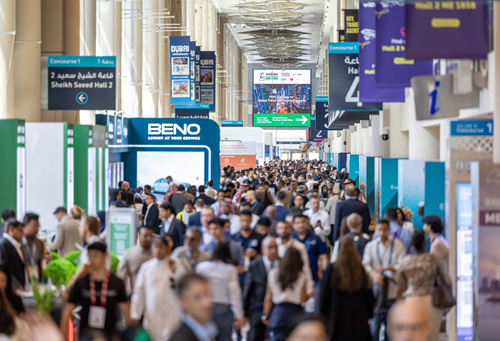Big-ticket events are becoming a central driver of international tourism and economic diversification across the Middle East, according to experts at Arabian Travel Market (ATM) 2025 in Dubai.
The GCC’s event and exhibition market is projected to reach US$827 million by 2029, growing at nearly 4% annually, with governments and private sector leaders increasingly viewing mega-events as a cornerstone of global positioning strategies.
From World Cup to global stage
Following the success of Expo 2020 Dubai and the FIFA World Cup Qatar 2022, momentum is building as the region prepares for future headline events, including Saudi Arabia’s hosting of the 2034 World Cup.
During an ATM panel session, industry leaders including H.E. Khalid Jassim Al Midfa, Chairman of Sharjah Commerce and Tourism Development Authority, Sebastien Doussin, Senior Vice President at dnata Travel Group, and Noor Ahmad Hamid, CEO of the Pacific Asia Travel Association (PATA), discussed how large-scale events generate long-term benefits beyond short-term visitor numbers.
“Big-ticket events provide a destination with an opportunity to establish brand positioning and exposure in a competitive global environment,” said Al Midfa. “These events play a vital role in supporting broader government objectives, but it is essential to invest in the right product for your destination.”
Sport, culture and technology
Doussin pointed to the growth of the Abu Dhabi Grand Prix, international golf tournaments and the arrival of NBA fixtures in the UAE as examples of how sports are boosting destination appeal. He also underlined the growing influence of technology, noting that the Qatar World Cup relied entirely on digital ticketing, making access more seamless for fans.
Hamid encouraged a broader definition of big-ticket events, encompassing concerts, conferences and cultural performances. He cited Bangkok’s booming K-pop concerts as examples of events that extend tourist stays and add value to destinations.
Live entertainment shaping travel
The latest ATM Travel Trends report revealed that live entertainment and sports are now key factors influencing travel decisions. More than half of surveyed industry experts cited leisure events as the most significant opportunity for future growth, reflecting travellers’ rising appetite for in-person cultural experiences.
The report also highlighted the rise of ‘bleisure’ travel, where business and leisure are combined. Remote working and flexible visas are enabling business travellers to extend their stays, offering new opportunities for destinations.
Business events gain momentum
Business events (MICE) are also emerging as a significant growth driver. Global business travel spending hit US$1.4 trillion in 2024 and is forecast to reach US$2 trillion by 2030. The Middle East’s share is expected to rise from 2.5% to more than 3% by the end of the decade, supported by world-class infrastructure and strategic location.
Danielle Curtis, Exhibition Director ME for Arabian Travel Market, said: “As big-ticket events continue to gain global prominence, their role in shaping tourism, driving diversification and enhancing international reputation has never been more evident.”
Looking ahead
Building on demand, IBTM@ATM will return for ATM 2026, offering a dedicated platform for business event suppliers, planners and associations. ATM itself will next take place at the Dubai World Trade Centre from 4-7 May 2026, positioning the UAE once again at the centre of global event tourism.


1 Comment
2fzz4c